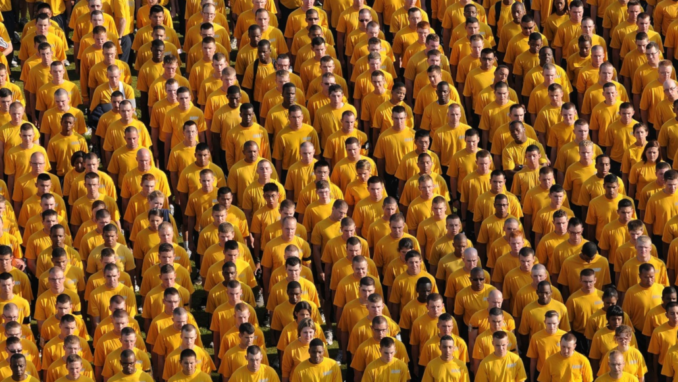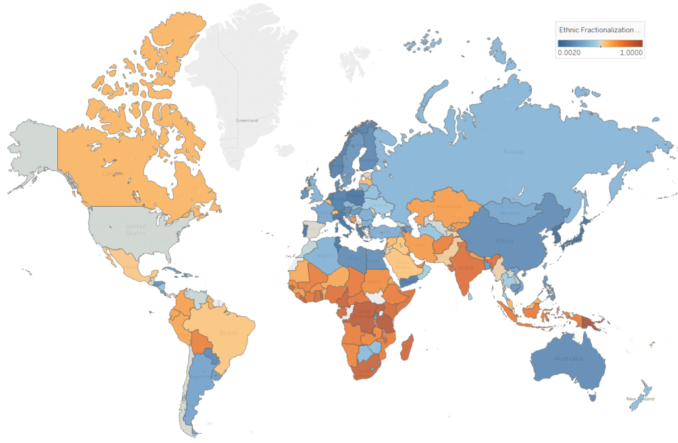
What is “monoculturalism”?
Take a trip around the internet and you’ll find out that monoculturalism is defined as “the cultivation of a single crop in a given area”. That’s all well and good and the analogy, if you think about it, is quite a pertinent one. However, if “monoculturalism” is a term most commonly associated with agriculture then what I was more interested in was obviously something that deserved another name. For the sake of argument let’s call it mono-culturalism. Delving further I found a page on Wikipedia that offers some definition of the phenomenon (without the hyphen). As one might expect, it isn’t seen in too positive a light, given that globalism, diversity and multiculturalism (the very antithesis of mono-culturalism) are the flavours of the moment.
The idea of mono-culturalism can be expanded to that of ethnocentrism. Ethnocentrism is a belief that one’s way of life is natural and valid. Such beliefs are likely to be prevalent among individuals and communities which have not been exposed to other cultures in depth. Colonialism might be described as an extreme form of ethnocentrism. This occurs when one nation or society takes over or politically dominates another country and imposes its own, natural and correct way of doing things on the other.
Rather than the suppression of different ethnic groups within a given society, sometimes mono-culturalism manifests as the active preservation of a country’s national culture via the exclusion of external influences. Japan, South Korea, and North Korea are examples of this form of mono-culturalism. (Wikipedia)

Jroehl [CC BY-SA 4.0], via Wikimedia Commons
As with the slave trade, we can only learn (unlike some other “cultures”) from history and do our best to make sure these things don’t happen again where we have any sphere of influence. This too may be something of a pipe dream; The fashion for importing “culture” that differs so greatly from that which I would contend is “traditional British” (culture) has led, amongst other things, to the wholesale abuse of vulnerable female British children by mostly Pakistani men, feral knife gangs from Somalia and other far flung regions roaming the streets of our major towns and cities happy to kill over even the smallest slight to their sense of “respect”, the “new” slavery (a particular favourite of Eastern European gangsters) where women often from their own country are trafficked for use in the “sex industry” and the importing of gullible and woefully uniformed people from the Far East, in the backs of lorries, to work as virtual slave labour in cannabis farms, massage parlours and nail bars, if they manage to survive the trip at all that is.
A chap called Anthony Marsella, in a paper on the subject of Globalisation (maybe unwittingly) touches on the fact that it (Globalisation) is actually the enemy of mono-culture, in as much as the relentless movement towards a fully Global economy will ultimately homogenise the whole planet. In this he misses the point because he tends to suggest that there WILL be a peaceful harmonisation into one dominant culture, when, in fact, we witness on a daily basis that this is far from the reality of the situation. As much as academics, intellectuals and politicians want us to believe otherwise, people like to be amongst their own.
Anthony J. Marsella, Ph.D., D.H.C.
In the West, there is widespread alienation of youth, abuse of substances, family disintegration, marginalization of minorities, racism, poverty gaps, vulgarities and excesses of public culture, extensive corporate and governmental corruption, and the destructive social and environmental consequences of rampant consumerism, materialism, and commodification.
Globalization involves the free movement of goods, capital, services, people, technology and information throughout the world. It also involves the international integration of potentially very different countries through the adoption of the same or similar world views, ideologies, and other aspects of culture. Marsella argues that this is mono-culturalism on a grand scale. Potentially it could lead to the suppression and loss of different ethnic cultures on a global scale.
“Hegemonic” Globalization and Cultural Diversity: The Risks of Global Monoculturalism
Against this background, where “progressive”, mostly city based, Western culture is seen as debauched and past it’s sell by date and some smaller, less dominant cultures are at risk of disappearing into that very hegemony, thus losing their identity, I wanted to offer a window into the small yet still existing mono-culture that can be found in many parts of rural Britain. It also exists in those larger villages and former industrial towns which have, somehow, remained largely unscathed by the twin joys of diversity and multi-culturalism, yet the progress of mass immigration will eventually and inevitably dilute this. I’m not looking at this through rose tinted glasses, societal problems abound within the indigenous population wherever one lives, but it’s obvious, to me at least, that importing millions of people without ever considering or consulting the citizens of the host nation, or taking note of the potential downside of often vast cultural differences, is a clear recipe for compounding the said problems.
I live in the rural North West, about 30 miles south of the border between England and Scotland. A couple of times a year the village hall committee arranges a “Big Breakfast” event. These events are the major fundraisers we undertake and they have always, up to now anyway, been very well attended. Central Cumbria, to the north of the more prosperous South Lakeland tourist hotbeds is primarily an amalgam of agriculture based, sparsely populated rural villages and small market towns. Quite a number of people live in even further isolation on individual farms or small farmsteads of two or three homes. The Big Breakfast brings many of these people together and I’m often in the enviable position, between frying eggs, of having a couple of minutes to stand back and watch the interaction.
I’m not going to dwell on the make up of the attendees too much, they range in age from young children to people in their twilight years. They are predominantly white, although it wouldn’t matter what colour they are and mostly Cumbrian, with a healthy sprinkling of people from all over the UK and even further afield. They all broadly share a “moral imperative” which is rooted in Judeo/Christian precept. Academics and anthropologists might want to call it, derisively, ethnocentrism. They may even have a point; to a certain extent, those that don’t know us too well will often think that British people can appear superior, we’ve collectively brought much to the civilised world (good, bad & indifferent) and we do tend to remember more the good than anything else, but it isn’t that. There’s a calmness about rural British people, naturally conservative, they’re mostly confident in their own skins and take pleasure in being self-reliant and family focused. Although many still work hard, especially those that work on the land, there is a laconic mood, a mild happiness that may even, in some peoples eyes, be something akin to self-satisfaction, but I don’t believe it’s that either. If I had to explain it then I’d say it’s a sense of “comfortableness”, something that comes from being able to understand ones neighbours, to want to talk to them and help them and to also be able to recognise the signals when they want to be left alone.
In the immediate area where I live there are few shops, an ever aging demographic and too many houses being bought up by weekenders seeking the rural idyll, making it hard for young people to stay in the area. Work that isn’t farming is scarce outside the towns, buses do run but the railway is long gone, many of the small pubs are closed and the ones that remain open struggle on as much for the sake of the community as anything else. On the surface it doesn’t seem to be much of a life but there is much to recommend it. I only hope that the younger families who are able to enjoy this slice of mono-culture and those that come after them continue to cherish it, because, if they don’t, they’ll all mourn its passing if the “Progressive Liberal” cognoscenti has its way.
© Colin Cross 2019
The Goodnight Vienna Audio file
Audio Player



